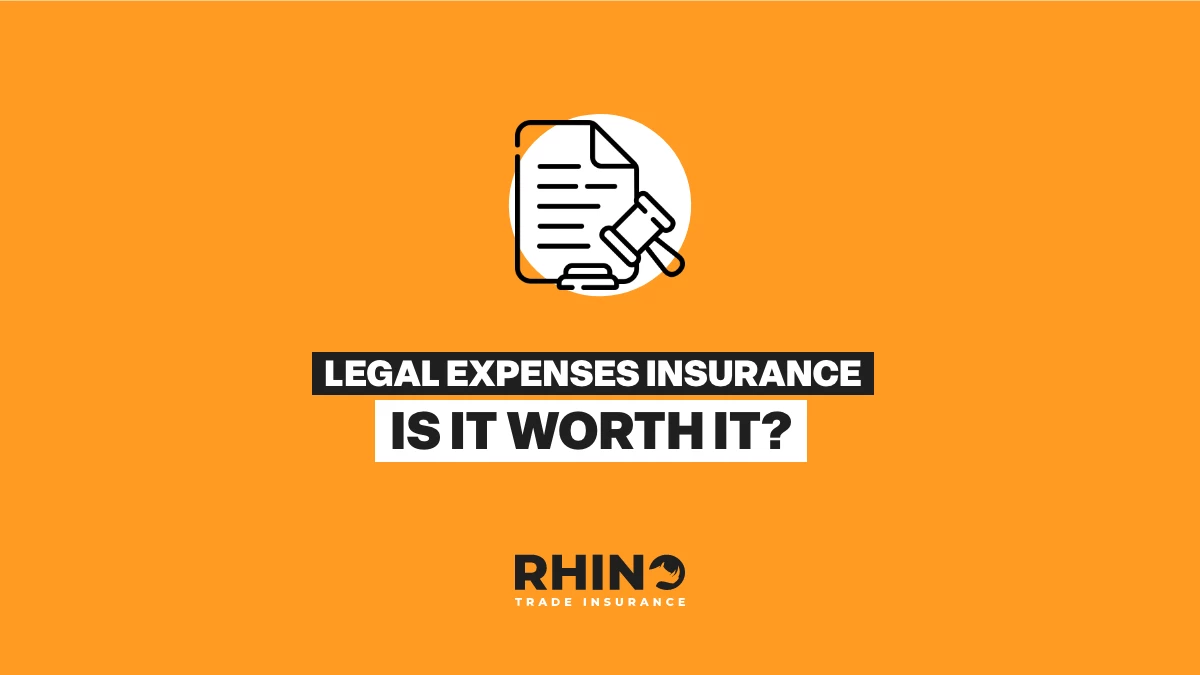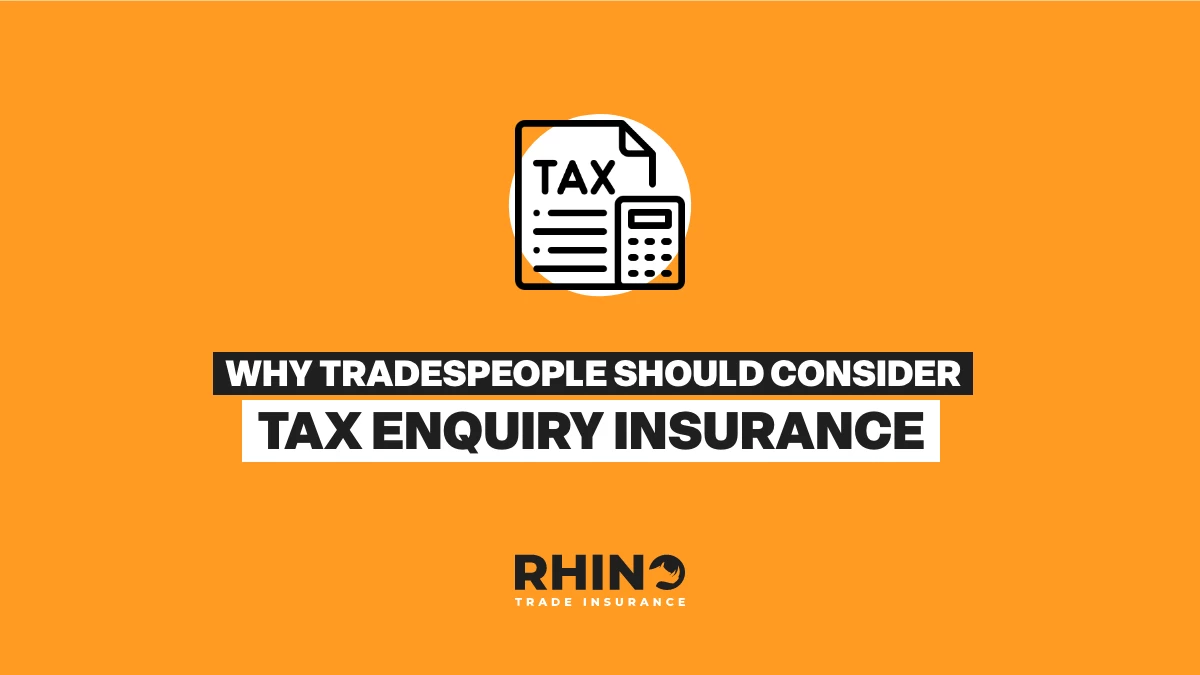
Legal Expenses Insurance – Is it Worth It?
Legal Expenses Insurance for tradespeople explained—what it covers, when you might need it, and how it protects against costly legal fees.
Are you a tradesperson wanting to strike out on your own? Maybe you’re already highly qualified in your trade with plenty of experience under your belt but you’re tired of working for someone else. Or perhaps you’re a newly-minted tradesperson with the energy and ambition it takes to start a thriving trades business right out of the gates.
Whichever of these sounds familiar, this article is for you. Here, we will explore the steps you should take when starting a trade business and offer some practical advice and tips for becoming a self-employed tradesperson along the way.
So, grab yourself a brew and join Rhino for this guide to launching a self-employed business as a tradesperson.
Do you know what you’re doing? Don’t take offence – this is essentially step one. You’re the best person to assess this, as nobody else knows your skill set and capabilities like you do.
Recognising your strengths and weaknesses
If you’re already fully trained in your chosen trade, you’re in a stronger position to start your solo career. Don’t worry if you’re not though – if you can identify the areas where you’re weaker and either undertake further training or get more on-the-job experience (by shadowing for example) then you’ll be well on the way to filling in the gaps that might otherwise be obstacles when you start your own business.
Upskilling
What level of training do you have as a tradesperson? Do you have City & Guilds qualifications, NVQs or ACS? Technically, you don’t need any formal qualifications to start working as a plumber but unless you’ve been an apprentice from a young age, it’s unlikely you’ll know the ropes enough to work alone without training. Vocational trade training is readily available in the UK for every trade imaginable from plumbing to electrics and everything in between. You generally need at least 2 GCSEs to start a training course.
City & Guilds currently offer qualifications and programmes funded by the Adult Education Budget for various trade sectors including courses in construction, chainsaw maintenance, tree felling, catering and gas engineering.
Next, the business plan. It’s not as complicated as it sounds, but you definitely need to decide which business structure you’re going to use.
Sole trader or limited company?
Choose whether you’re going to trade as a sole trader or a limited company. Many tradespeople starting out on their own use the sole trader model to begin with, as the taxes are simpler (you generally just have to file a Self-Assessment at the end of every tax year). An accountant can help you with this – more on this later.
You can still hire employees as a sole trader so long as you register as an employer with HMRC and submit a PAYE registration form. Whichever you choose, make sure to register your new business online with HMRC, and register with Companies House too if you’re going with a limited company model.
Get insured
You’ll need business insurance in place from day one of trading, so this is something to sort out sooner rather than later. You’ll need Public Liability Insurance with an appropriate level of indemnity (between £1M and £5M). If you plan to hire any employees you’ll need Employer’s Liability Insurance, too. From there, you can add policies as you see fit to build cover that suits you. Speak to Rhino – we’ll point you in the right direction when it comes to the trade insurance you need.
Get a vehicle
You’re going to need a trusty work vehicle. You don’t have to buy your dream van just yet – that Ford Ranger or Merc Sprinter might have to wait. Instead, get the best roadworthy vehicle within your budget and make sure you’re covered by Van Insurance to cover its use for commercial purposes.
Price your Jobs
So, you’ve laid the foundations, but what about charging for the jobs themselves?
Consider profits
Working for yourself has to be worth your while, so you need to price jobs to make a profit. If you’ve been working with someone else for a while, you’ll already have a good idea of the going rate for the jobs you’ve been doing. But if you’ve been working for a contactor, they’ve been taking the lions share of the profit for these jobs and leaving you with the crumbs. Not anymore – when you work for yourself you can look forward to taking 100% of the profits, although it’s important not to get carried away and take too much profit initially – more on that later.
Don’t go too high – or too low
Pricing jobs is not an exact science. It depends on a few factors, such as the economic climate, the current demand, the area and your level of experience. Aim to be neither too cheap nor too expensive, and don’t forget material costs, the cost of running your van, the cost of business insurance, a warehouse space (if necessary) and tax. If you have no clue where to start with pricing, test the market first and see what other tradespeople are quoting. Ultimately, your prices will be unique to you – it’s about covering your overheads and making a profit too, without being so busy that you’re rushed off your feet for 12 hours a day 365 days a year (a sure sign that you’ve priced yourself too low).
If you’re getting inundated with jobs and customers are clamouring for your services – don’t be shy – put your prices up.
Make sure you give potential customers a written quote which breaks down the work that needs to be done, which will help avoid disputes down the line.
You might be all set up and ready to trade, but what if the jobs aren’t falling into your lap?
Establishing a strong online presence
An absolute must in this day and age. Luckily, creating your own website is simple and a basic website can be made for free using a free website hosting site. Be sure to include your contact details, areas covered, a description of your services and a few photos of completed jobs. As time goes on you can add customer feedback too (only positive of course).
Utilising social media
An Instagram account and Facebook page for your business are the minimum you’ll need. They’re free and practically instant to set up. Add and follow lots of local business accounts and interact with them as much as you can to build your online presence. Again, make sure you add lots of information about your services, and include your contact number, email and lots of engaging photos of the work you do. Feel free to inject a little of your own personality into your pages, but always keep it professional. Register yourself on Google Business, too, so you can show up on Google Maps as a local tradesperson for those searching on Google.
Get on trade platforms
Trade platform apps like Book a Builder and local directories like CheckATrade, MyBuilder, TrustATrader and Yelp can open you up to a wide variety of jobs in your local area.
For more on how to market yourself, read our blog on How to Stay Competitive in the Trades Industry.
You’re in a strong position to start booking those jobs, but what if your skills lie on the jobsite rather than in the world of business, tax and finance?
Get an accountant
A good accountant is a must for anyone starting out in business, as they will be able to help you establish a day-to-day bookkeeping system (absolutely essential) and help you make sense of taxes. Tax records must be up-to-date and accurate, and you must keep a log of things like profit, loss and capital purchases – our advice is don’t attempt to take all this on without a professional to guide you.
You don’t even need to see them in person. These days, online accountants will organise your books, file your taxes, advise on your allowable expenses, run payroll (if applicable) and offer guidance on how to grow your business all from the other end of a laptop and phone. Things like VAT, PAYE and corporation tax can get confusing, so don’t try to take it all on yourself. You might be surprised how affordable online accountants are, so look into it today.
Keep your tax separate
Keep those taxes back. It’s easy to forget about this when you’re excited to be booking up work, but the taxman should be one of the first in line when you complete a job. Don’t forget to open a separate bank account, too. It’s not a legal requirement if you’re a sole trader but it’s a good idea to keep your money separate as it makes it easier come tax season. For limited companies, it’s a legal requirement to have a business bank account.
Don’t blow your profits
This comes down to your aptitude as a businessperson in general and might just be the thing that makes or breaks you as a self-employed tradesperson in your chosen industry. Whenever you make a profit, put at least 50% back into your business. Don’t be the person who takes their first grand and blows it on a holiday or a new sofa. Instead, you need to get used to paying yourself a small salary – enough to cover living expenses but not much more – until you’ve grown your business to a place that you’re happy with. Be prepared that this could take several years.
Investing 50% of your early profits into things like better tools, van repair, van upgrades, great insurance – as well as building up a rainy-day buffer – will mean you’ll be one of those tradespeople whose business grows slowly and steadily rather than burns out.
Grow your business
You may not be able to do this right off the bat, but if you’ve been trading for a year or so and you’re both busy AND making a profit, then it might be time to get someone else on board. This will be a proud moment for you because it means you’ve come full circle – you’ve gone from being the employed to the employer.
The key here is to do things properly. After you’ve found someone you’d like to bring on board, check their documents (ID and Right to Work) and make sure any DBS check is done if necessary, as well as going through the HSWA checklist. Give them a written statement of employment and make sure you’re registered as an employer with HMRC.
If you’re an employer, you’ll have to produce a payslip for your employees each month, as well as make sure you deduct tax and National Insurance from their wages to submit to HMRC. You know that accountant we mentioned earlier? They will come in handy at this stage.
Hiring an apprentice is a slightly different process – check out the HMRC website for more information. Employing an apprentice: Overview - GOV.UK (www.gov.uk)
So, you’re running a busy trades business? Well done. But what happens when your work commitments start to affect your stress levels and even your personal life?
Importance of time management
Many new solo tradespeople run into the problem of being so busy juggling the different areas of the business that they quickly feel overwhelmed. The best solution to this is to try to delegate where you can. Whether that’s getting bookkeeping software such as Xero or QuickBooks to streamline your accounts process (a good accountant should provide this), sending an apprentice to price up cheaper jobs or using an app like Tradify to help outsource business management, remember that the business side of things shouldn’t eclipse the hands-on side.
Check out our blog on Maximising Productivity in your trade business here
Stress management strategies
And...relax! Don’t forget to take time out for your own enjoyment. Whether that’s spending time with friends or family, participating in a hobby or doing up your own house (forget that joke about how tradespeople’s houses are always half-finished), make sure that you don’t get burnt out while building your business.
We hope you’ve enjoyed reading our guide to self-employment for tradespeople. Remember, Rhino Trade Insurance are the trade insurance experts and provide low-cost, comprehensive cover to thousands of UK tradespeople just like you. Give us a call to discuss your requirements today on 0115 350 7904.
Legal Expenses Insurance for tradespeople explained—what it covers, when you might need it, and how it protects against costly legal fees.
Worried about a tax investigation? With HMRC cracking down in 2025, Tax Enquiry Insurance from Rhino gives UK tradespeople expert protection and peace of mind.
Rhino Trade Insurance CEO Troy Stevens joins industry leaders at the House of Commons to discuss the rising issue of tool theft—highlighting its impact on UK tradespeople and the importance of awareness and protection.
Tell us your trade and get a tailored insurance quote for your business in seconds
Our team of experts are available to talk to Mon-Fri 08.30-17.30 and Sat 10.00-14.00

